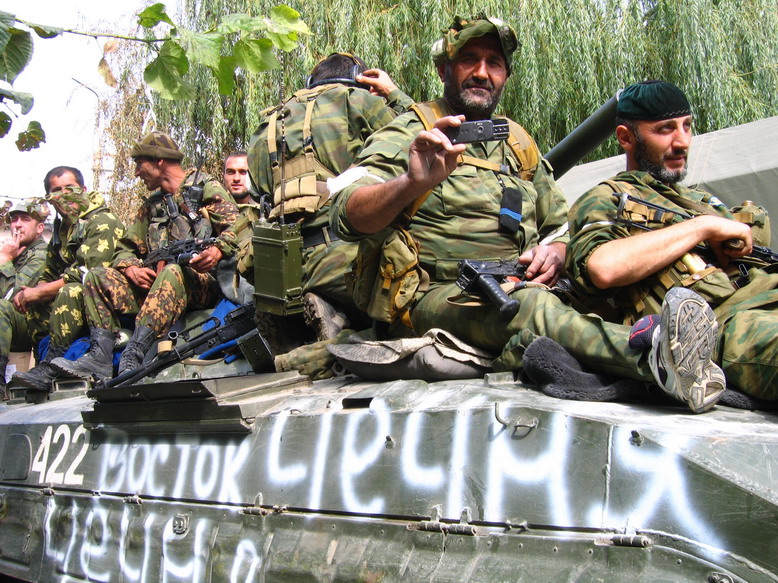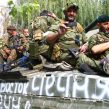
Russian Analysts Call Ukrainian Involvement in the North Caucasus ‘Futile,’ but Gear up to Counter It
Publication: Eurasia Daily Monitor Volume: 12 Issue: 203
By:

Russian experts have reacted to the recent establishment of a group in the Ukrainian parliament called “For the Free Caucasus.” One of them, Vladislav Gulevich, has predicted that the Ukrainian political forces that want to detach the North Caucasus from Russia will fail because Ukraine “has never had high-quality specialists on the Caucasus and never been an authoritative intermediary between the Caucasus and Russia.” Despite such a flat dismissal of the Ukrainian initiative, however, the author then went on to try and pit the Ukrainians against the North Caucasians. Kyiv, he said, has tried to “play on the Caucasian field” three times: first it attempted to help Georgia against the Abkhaz in 1992–1993, then it helped Jokhar Dudaev’s Ichkeria, and then it “secretly supported Georgia’s aggression against South Ossetia in 2008.” Further, the author reprimanded the Circassians for the “strange wish of some Circassian activists to seek justice from those who do not have it”—meaning the Ukrainians. In addition, the Russian analyst tried to scare the North Caucasians by pointing to Ukrainian nationalist groups that allegedly aspire to annex parts of the northwestern Caucasus (Kavkazgeoclub.ru, October 30). Other Russian analysts have raised fears that the Ukrainian security services are set to increase their presence in the North Caucasus (Svpressa.ru, November 5).
Israeli activist Avrom Shmulevich has advocated for Ukraine’s greater involvement in the North Caucasus, both to thwart Russian aggression against Ukraine and to have a safer neighborhood. Supporting civil activism in the North Caucasus, in Shmulevich’s opinion, should pave the way for a peaceful transition to modernity in the region. This is justified, according to the Israeli activist, because Russia is facing possible disintegration (Szona.org, October 15).
Indeed, the Ukrainian initiative to prepare civil activists in the North Caucasus to pave the way for a peaceful transition after Russia’s demise is likely to face an uphill battle. The reason for its difficulties is not the “absence of quality specialists on the Caucasus in Ukraine,” but the increasing authoritarian tendencies in Russia, which are progressively diminishing the space for political and civil activism. At the same time, there is still some room for dialogue and exchange between Ukraine and the North Caucasus that would potentially benefit not only Kyiv and the North Caucasians, but Moscow as well, provided the latter is interested in the non-violent evolution of this volatile region.
Whether the Russian government is in fact interested in the non-violent evolution of the North Caucasus is increasingly under question. Some Ukrainian analysts point out that the North Caucasus may have a part to play in Moscow’s expansionist plans abroad—specifically, in the Middle East. According to the Ukrainian analyst Pavlo Podobed, Vladimir Putin is trying to force the West to accept his alliance against the Islamic State (IS) in the Middle East. Part of the plan includes ramping up Russia’s fight against the IS in the North Caucasus. Podobed notes that Russia’s recent actions in Syria have strikingly resembled Russia’s actions in the North Caucasus. In both places, Moscow has claimed to be attacking the IS, while in fact Russian forces have attacked groups that are actually opposed to the Islamic State. Podobed estimated that since June 1, Russian government forces have killed 38 militants of the Caucasus Emirate, 42 militants with unclear affiliation and two militants affiliated with the IS. These figures are startling, the Ukrainian analyst writes, especially as the Caucasus Emirate has been significantly weakened for the past year, while the IS has gained strength. The only plausible explanation, according to the analyst, is that the Russian government is working to eliminate IS competitors from the scene with an eye on far-reaching foreign policy goals (Sprotyv.info, November 5).
The fact that Moscow makes a connection between its involvement in the Middle East and the North Caucasus is supported by Putin’s unexpected visit to an obscure Dagestani exhibition in Moscow. At the exhibition, he said “no one has been able to frighten the Russian people as a whole (rossiysky narod), especially Dagestan” (Kremlin.ru, November 3).
This is not the first time Moscow has used the North Caucasus in its foreign policy interests. After the 9/11 attacks in the United States, Putin largely succeeded in representing what essentially was a separatist movement in Chechnya as a part of the international Islamic terrorist network. Putin thereby undercut international support for the Chechen national liberation movement and criticism for the egregious human rights violations Russian forces committed against civilians in Chechnya. For years, Putin pretended to align with the US in its fight against the international terrorist network, but essentially regarded that period as a time to prepare Russian forces to pose a decisive challenge to the West.
Given the previous history of how Moscow used the North Caucasus in its foreign policy interests, including the deployment of the Vostok Battalion, made up of ethnic Chechens, to eastern Ukraine, then Ukraine’s growing interest in the North Caucasus is even more urgent. The Russian government is increasingly involved in Syria and may further expand its involvement elsewhere in the world where it sees a window of opportunity. The North Caucasians appear to occupy a prominent place in the Kremlin’s foreign policy plans.




